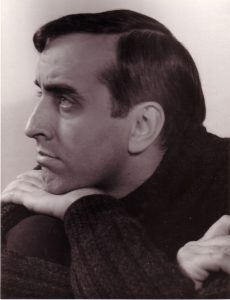Bohemian Embassy tribute honours founder Don Cullen
By Annemarie Brissenden
At one time, it was one of the few places in Toronto where you could be a little bit different. It was a launching ground for some of Canada’s most legendary cultural icons, like Margaret Atwood and Lorne Michaels. It was even an ersatz university for some. There was never anything like it before nor has there ever been anything like it since. And later this month, a group of artists will gather together at the Yorkville branch of the Toronto Public Library to play tribute to the Bohemian Embassy and its founder Don Cullen.
Founded in 1960 on St. Nicholas Street, the Bohemian Embassy was a coffee house whose four incarnations also included stints at Rochdale College (an experimental university on Bloor Street that ran from 1968 to 1975), Harbourfront, and Queen Street West in the early 1990s.
“I got the idea from a friend who had a house that was dedicated to the arts,” said Cullen, an actor and writer who worked for many years at the CBC. “He had a huge classical music collection, and had people over every night for coffee.”

PHOTO COURTESY DON CULLEN: When founding the Bohemian Embassy, Don Cullen (pictured) was influenced by the coffee houses of 18th-century London attended by people like Samuel Johnson, James Boswell, Oliver Goldsmith, Henry Purcell, and John Locke.
The name came to him from a throwaway comment of a colleague, who had described an apartment a group of friends were sharing as a bohemian embassy.
“It was something she tossed off, but I thought it was a great name for coffee house.”
With a wide interest in the arts and other intellectual pursuits, Cullen had always admired the coffee houses of 18th-century London that were attended by people like Samuel Johnson, James Boswell, Oliver Goldsmith, Henry Purcell, and John Locke.
Although there were other coffee houses in the city at the time, each only had one focus, usually music. What Cullen wanted was something that would be home to a variety of performances, including sketch comedy, drama, poetry, and, of course, music.
“A lot of people might see it as folk music, but it was more than that,” said David Woodhead, a musician with the Perth County Conspiracy who played the Embassy during its fourth incarnation in the 90s. “There was quite a lot of variety in the types of entertainment: comedy, spoken word…a magician, an Elizabethan lute player. Gwendolyn MacEwen and Milton Acorn would show up.”
Linda Goldman, who is organizing the tribute, characterized Cullen as “a Toronto treasure [who] gave a lot of people their careers, [and a] venue for their start”.
“It was a wonderful university, because you could learn so much from the other performers”—Chick Roberts, musician
She met Cullen a few years ago, and learned of what she termed “his monumental role in the city’s literary, theatrical, and musical scene”. Many of the singers she adored as a teenager in the 1960s — Gordon Lightfoot, Ian and Sylvia — got their start or played at the Bohemian.
“We were large enough that we could pay people,” said Cullen. “Gordie [Lightfoot] worked for $15 a night. Mind you, coffee was 10 cents then.”
Cullen also listed Margaret Atwood, MacEwen, and Al Purdy, “now a statue in Queen’s Park”.
“I’m pretty certain that Irving Layton showed up,” said singer Joanne Crabtree, who like Woodhead will perform at the tribute. “This venue was a lot more than a folk club; it became a magnet for a lot of young people escaping from the burbs.”
Actor and singer Chick Roberts described it as a “wonderful university, because you could learn so much from the other performers.”
“I wanted a cross-section of different things,” said Cullen, who added that English coffee houses were sometimes “referred to as penny universities”.
Everyone is quick to point out that while the diversity contributed to the Bohemian’s uniqueness, it was really Cullen’s role as a mentor figure that made the place what it was.
“Don bent over backwards to give you a venue to play,” said Woodhead, describing how he brought a kind of nurturing to it. “He always seemed glad to see you, hear you.”
Roberts said it was a “place where you could try songs and experiment. You could do anything, plays no other theatre in Toronto would try.”
“The Bohemian Embassy was for me like having a child,” said Cullen. “You want it to work to be important and fun and hopefully worthwhile. And it was. So I feel good about it.”
The Yorkville branch of the Toronto Public Library (22 Yorkville Ave.) hosts Remembering the Bohemian Embassy on Sept. 23 from 6 to 9 p.m. in the program room.
READ MORE:
ARTS: Unveiling literary history (September 2015)
ARTS: Chiarandini’s hippies on canvas (May 2015)
ARTS: Laugh-out-loud funny, cringingly frank, desperately tender (February 2015)

2 responses so far ↓
1 Lesley (Dalrymple) O'Neil // Sep 18, 2016 at 4:25 pm
For several years, in the middle ’60s, I had the honour of working the desk at the entry of the Bohemian Embassy’s 7 St. Nicholas location. In return, I had access to a place that was like no other, and met not only Don Cullen but many people whose names were, and in some cases still are, well known.
As I was either in college or working, my stints at the desk were only on Fridays or Saturdays, which were mainly music nights. But there were a few other talents as well.
Some names? In no particular order: Amos Garrett, Al Cromwell, Jim McCarthy, Ian Tyson, Gord Lightfoot, Mary Jane and Winston Young, Carol Robinson, Jackie Burroughs, Damiano, Barrie Baldaro, Greg Winkfield, Doug Brown, Bruce Whitehead, Neil Broadfoot, Don Mank, Terry Quinn, Bram Morrison—those and others whose faces are with me but whose names are gone.
And last, but definitely not least, Chick Roberts.
2 Ray MacLeod // Sep 19, 2016 at 11:54 pm
Rasputin!